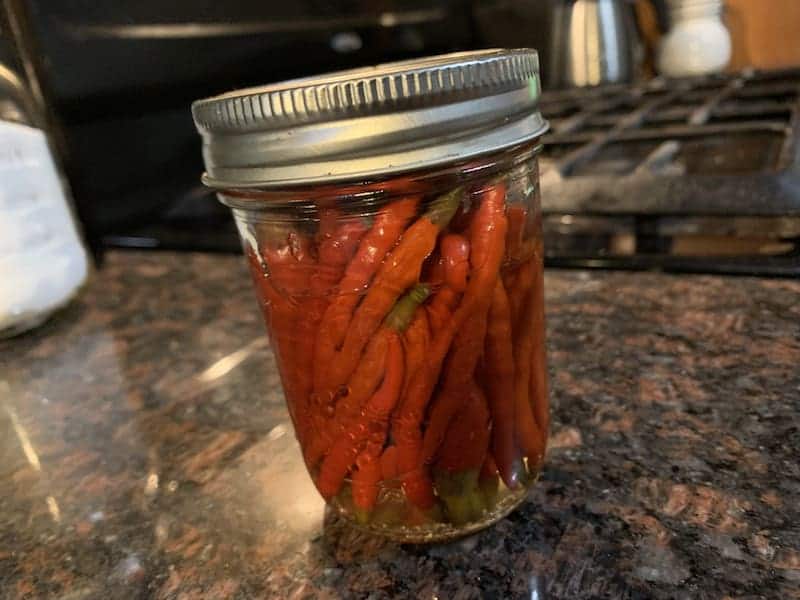Why Ferment Hot Sauce?
There are probably thousands of different types of hot sauce out there, but did you know that a lot of them are actually fermented?
So why ferment hot sauce, anyway?
There are many reasons for why fermented hot sauce is popular, including the complexity in flavor it brings, positive effect on the digestive system, and long shelf-life. Keep reading to learn more.

Fermented vs Non-fermented Hot Sauce
While the main ingredients in fermented and regular, non-fermented hot sauce are pretty much the same, there’s actually a big difference between the two.
If food is fermented, it means it has undergone a natural process where microorganisms (in other words, bacteria) and enzymes convert the carbohydrates in the food into alcohol and/or acid in an anaerobic environment (or an environment with no oxygen).
Fermented hot sauce is made by putting peppers (and if you choose, fruit) in a salt brine solution in an airtight container, like a mason jar. Time is a key step in the fermentation process, and the peppers are allowed to ferment in the salt brine for about a week or longer.
This allows healthy bacteria (like lactic acid bacteria) to convert carbohydrates (or sugars) in the peppers into acid. Maintaining the correct pH is important here for keeping out bad bacteria and preserving the hot sauce.
Some examples of pretty popular fermented hot sauces that you probably already know are Sriracha and Tabasco (which is fermented in oak barrels).
Regular hot sauce, on the other hand, is a simpler process where the peppers are combined with vinegar. It’s ready to consume as soon as you make it, after blending the ingredients together. Fermented hot sauce in comparison needs time to process.
Why Is Hot Sauce Fermented?
Fermentation began in a time before refrigerators as a way of preserving food and prolonging its shelf-life. This way people could store and enjoy food knowing it would last them a long time. (Nowadays, we pasteurize to prolong shelf-life, which can have a negative effect on fermented foods. Click here to learn more).
Probably the main reason people ferment hot sauce today is because it gives the hot sauce new and complex flavors, including a pleasantly surprising tanginess, compared to non-fermented hot sauce.
Also, regular hot sauce will give you flavor that hits you all at once, whereas fermented hot sauce is more subtle and layered.
Is Fermented Hot Sauce Better?
An argument to be made against fermented hot sauce is that it isn’t as spicy as regular, non-fermented hot sauce. Non-fermented hot sauce generally has more heat, which you taste instantly with the other flavors of the hot sauce.
In comparison, heat is lost in the fermentation process, and fermented hot sauce is usually milder. That being said, if you’re using some of the spiciest hot peppers out there (like Carolina reapers or ghost peppers), you should still be able to get a good amount of heat in your fermented hot sauce if you’re making it yourself at home.
So, you can get the complexity of flavor with fermented hot sauce while still having a hot sauce that’s packed with heat.
In addition to the complex flavor of fermented hot sauce, there are a few other notable benefits:
- Makes food easier to digest, as it’s already partially broken down
- Includes “good” bacteria, also referred to as probiotics, which helps in digestion
- Has a long shelf-life and lasts a really long time
- If you have a lot of frozen peppers stocked up in your fridge, you can ferment them and bring back a lot of the flavor
How Long Should Hot Sauce Ferment?
Hot sauce takes about 5-7 days to ferment. The most active fermentation will occur in the first 1 to 2 weeks or so, then will die down.
You’ll get more complex flavor the longer you ferment it (some fermenters ferment their hot sauce for months), but a week is enough time to get a pretty good ferment on your hot sauce.
Fermented hot sauce will continue to ferment after you bottle or jar it, causing changes in flavor and color. Click here for some tips on how you can stop fermentation in hot sauce.
In Summary
I think the better question here is, why not ferment hot sauce?
Fermented hot sauce is used just as frequently as regular, non-fermented hot sauce and just gives you the option of changing things up with more depth and flavor. And, it’s good for your digestive system and will last you a really long time without spoiling!
It’s most definitely worth having a bottle or two in your kitchen.







